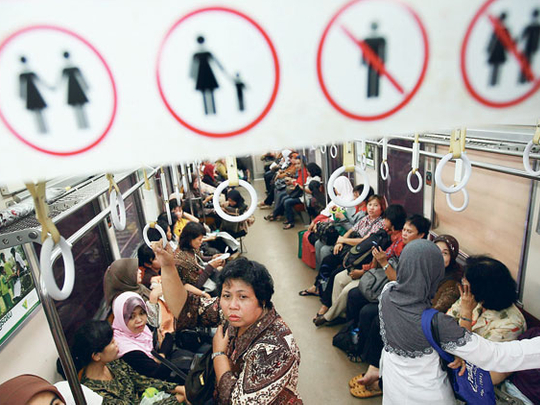
Jakarta: As the train rattled into Indonesia's capital, 19-year-old Wiwit Wahyuningsih plopped down on a soft, pink-cushioned seat in a carriage newly designated exclusively for women.
It was a great feeling, the university student said, knowing she didn't have to worry about being ogled at, pinched or even groped.
"The trains are always so packed, there are thousands of people crammed up against one another," she said as she arrived at her station, books tucked beneath her arm.
"Especially during morning and evening rush hours, it's very common to be harassed or touched by men, intentional or not."
Indonesia, a secular nation home to the world's largest Muslim population, is often held up as a beacon of modernity. Women wearing headscarves — for religious reasons, fashion or in some cases to avoid unwanted attention — can be seen walking alongside friends in shorts and tank tops in glitzy shopping malls.
Flirtatious teens fill coffee shops and male and female co-workers sit side-by-side at outdoor food stalls.
Except in mosques or religious schools, segregation between the sexes is rare.
But the state-run train operator PT Kereta Api Indonesia decided to set aside two cars in an eight-coach commuter train that runs between the capital and outlying suburbs after being flooded by letters of complaint from women.
As they increasingly enter the work force, women now account for half the 500,000 passengers riding the train in the greater Jakarta area every day.
The new train service for women had a soft launch on Thursday and went into full swing yesterday.
Possible expansion
"We need to protect them," said Makmur Syaheran, a spokesman for the company, adding that if the service is a success, it could eventually be expanded to other trains in the sprawling archipelagic nation.
Stories about sexual harassment have made headlines in local papers in recent months and have filled up commentary pages.
They also have become popular topics on blogs and social networking sites such as Facebook and Twitter.












